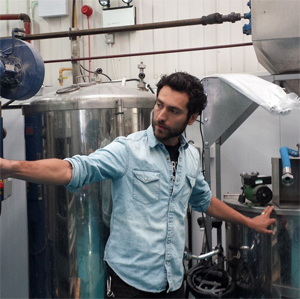LONDON—On Wednesday afternoon, Pete Brown, the noted British author and beer journalist, was settling into a pint of real ale at Euston Tap, a tiny pub at the entrance to a rail station. As it often does when industry-minded folks are talking, the conversation turned to the word “craft” and how it relates to beer.
While the United States has a largely regarded definition, as coined by the Brewers Association, a group that represents small brewers, other countries do not. Brown didn’t have the answer for what “craft” is in the United Kingdom, but said it’s a lot like love. “You know it when you see it,” he said.
A few hours later, two brewers—part of London’s new beer generation—announced that they were working with others to create United Craft Brewers (UCB). The aim, they said, is to promote and protect the interests of British craft breweries, their beers and the community of beer enthusiasts. They also released a definition, which is subject to change, but sets the framework of what’s to come with UCB.
Jasper Cuppaidge (founder of Camden Town Brewery) and Logan Plant (founder and brewer of Beavertown Brewery) made the announcement during a panel discussion at Plant’s brewery, part of the Brooklyn Brewery’s Mash tour. (Full disclosure: All About Beer Magazine is a partner on the Mash tour and this reporter was seated on the panel.)
The UCB definition of craft currently reads:
A craft brewer is:
Authentic: Brews all beer at original gravity. Owns and operates a craft brewer based (HQ) in UK
Honest: The place where the beer is brewed is clearly listed on the label of the beer. All ingredients are clearly listed on the label of the beer. All the beer is brewed at a craft brewery.
Independent: Less than 25 percent of the craft brewery is owned or controlled (for equivalent economic interest) by an alcoholic beverage industry member that is not itself a craft brewer.
While known throughout the world for its brewing traditions, iconic breweries, and production of real ale, known as cask, the U.K. brewing industry has undergone a renaissance in the last decade. A new generation of brewers are making lagers and ales, packaging their beer in kegs, bottles, and cans, and experimenting with flavorful ingredients. This is a break from the way things were done, and consumers, especially the younger demographic, are responding and seeking out these new beers.
It’s worth noting that there is already a Society of Independent Brewers (SIBA) that operates in the U.K., but Cuppaidge in a separate interview said that the group was “too slow to adapt” to the growing beer culture in the U.K., especially the number of smaller breweries opening throughout Britain, Ireland, Scotland and Wales. “It’s about diversity and the old guard hasn’t embraced the craft beer movement.”
Cuppaidge says the ultimate goal of the UCB will be to promote and protect the interest of member brewer, to educate members, as well as drinkers, and to build a culture of quality in craft brewing through promoting best practices in all areas.
The UCB expects to be up and running within a few weeks and is currently in the education phase, reaching out to breweries across the U.K., signing up new members.
CAMRA Change
There was one other change of note out of the U.K. last week when then Campaign for Real Ale (CAMRA) voted to support the practice of serving real ale from kegs.
“It was clear from the debate in the hall that the majority of members think that criticizing drinkers for not choosing real ale is counterproductive,” said CAMRA chief executive Tim Page. “Encouraging people to come back to beer from other drinks is the first important step, and once they’ve discovered the wide range of beers available our job is to educate and help them discover the delights of real ale, ciders and perries. This will reinforce the message that we’re a campaign for, not a campaign against, and also remind people that when they denigrate those choosing to drink ‘non-real ales’, they are not speaking for CAMRA.”


That’s an interesting definition of craft beer. It seems to require only that there be an actually brewery in the UK, i.e., it could be foreign-owned, that the brewer eschew high-gravity brewing, and state on the label the ingredients and place of manufacture. I’m not clear if the intent is to permit contract brewing operations.
I don’t quite understand the concern with high-gravity (if I have that part right) or at least, why ban that but not pasteurization?
If I was writing the definition, I would exclude any form of heat pasteurization. Various forms of filtration, from DE to centrifuge to cold crash, seem inevitable but applying heat to beer seems to me inimical to the craft or crafted spirit.
Gary Gillman
No thanks, we’ve got one. http://www.craftbeerbrewers.org/
‘especially the number of smaller breweries opening throughout Britain, Ireland, Scotland and Wales.’
Erm… Scotland and Wales are in Britain! Don’t conflate ‘England’ with ‘Britain’!